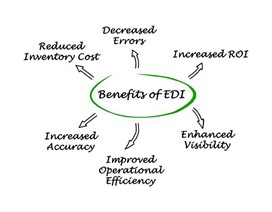In our current super-charged technological business world, most organizations need to be using Electronic Data Interchange (EDI) for their business-to-business (B2B) transactions. The organizations utilizing EDI to its fullest potential, are the businesses who are benefiting most from automation rewards. Fully integrating EDI into your business offers improved visibility over business partner transactions and eliminates the use of manual processing.
What is EDI?
Not familiar with EDI? Electronic data interchange (EDI) is the exchange of business documents from computer-to-computer, eliminating the need for paper transactions and the need to fax documents. Although this sounds simple, EDI documents use specific computer record formats that are based on widely accepted standards. This means that businesses can easily connect electronically to share data. However, each company benefits from the flexibility allowed by EDI standards to suit their individual business needs.
Why do I need to use EDI?

According to Chandana Gopal, research manager at IDC, “Enterprises have to continue to invest in modernizing B2B infrastructure in order to stay competitive in the digital economy.” EDI is widely used across a variety of industries. Virtually all industries use EDI for one thing or another. From invoices to change requests, manufacturing reports, purchase orders, shipping, receiving, payments, and so on, all go through EDI. What does this mean? It means any industry that has any involvement with those types of transactions or sharing of information will also have a need for EDI. This is especially true for industries, such as health care, insurance, trucking, retail, manufacturing, security, wholesale, grocery and construction, to name a few.
How EDI Works
EDI integration is created when an EDI workflow is established between trading partners. EDI integration is achieved through two primary steps:
1) Establishing the EDI documents, protocols, transactions, and endpoints that you will use to exchange data with your trading partner
2) Converting EDI data into a format that can be used in your own back-end technical environments, such as your ERP system or accounting solution.
In the center of the EDI integration diagram below, data structures are translated into a mutually agreed upon EDI standard format (ANSI X12, EDIFACT, etc.). Translating internal data into EDI files enables both trading partners to speak a common language and communicate with one another.
The Benefits of EDI

Implementing the EDI process into your business has the potential to provide many benefits to your business. These benefits include:
- Processing paper documents is extremely more costly than processing computer-to-computer data exchange (manually processing a paper order can cost at least $70 or more. Processing an EDI order can cost less than one dollar)
- Employee processing time is drastically reduced by implementing EDI (EDI orders can be processed in as little as one business day)
- Processing orders and data electronically yields less errors simply based on the process being completed by a computer, without human intervention.
- Business transactions are processed faster, increasing productivity and thus reducing inventory levels, providing better usage of storage space, better inventory planning and thus fewer emergency expedited orders with excessive associated costs.
Although there are very few drawbacks to the EDI process, one that must be mentioned is the business’ ability to ensure that they have the resources in place to make an EDI program work.
Because EDI processing must follow strict regulations for processing, many companies choose to outsource the EDI process over keeping the process in-house to be managed on site.
Choosing an EDI Outsourcing Company
Integration, Inc. provides everything you need to be EDI compliant and capable in one all-inclusive outsourced package. It’s as easy as having a fax machine and an email account.
That’s all Integration, Inc. needs to make your EDI processing a success. Your business will never need to worry about software installation, software upgrades, document format translation, mapping of hundreds of field names, purchase of an additional server space, transaction communication requirements for each partner, EDI VAN fees, yearly contracts, staff training or even staff turnover.
Integration, Inc. does it all for your business. Integration, Inc. specializes in resolving information technology issues confronting small to medium sized organizations. By allowing Integration, Inc. to complete your business outsourcing needs, we can enable your company to become more efficient and cost effective, thus increasing your business productivity and overall revenue. To learn more, contact at 860-623-0004 or online at www.integrationinc.com.
Similar Posts
Ready to discuss your EDI or BPO needs?
Our team can’t wait to talk to you about your business's unique needs so we can provide a solution quickly and cost effectively.
Let’s talk today